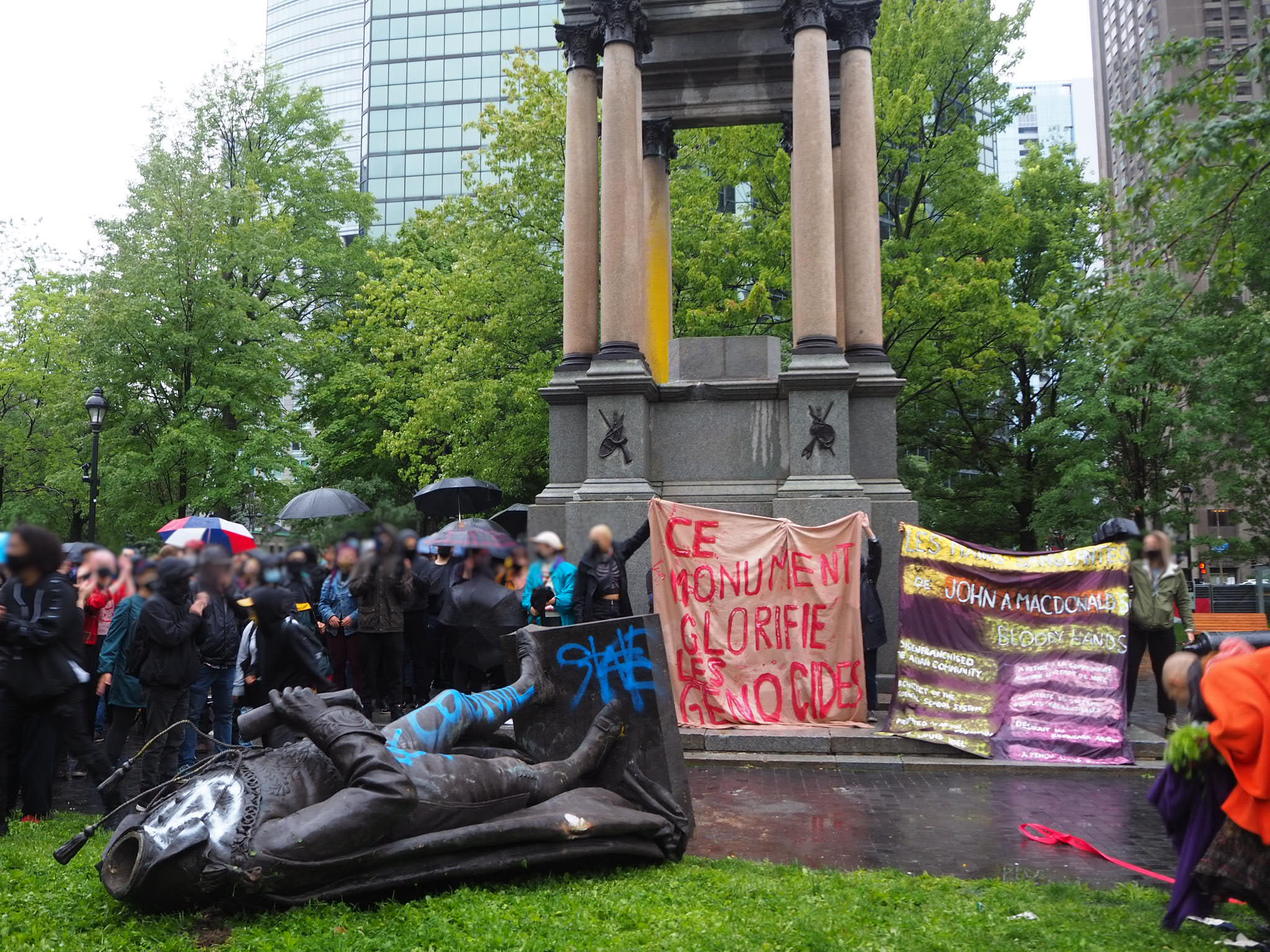On Aug. 29, protestors toppled a statue of John A. Macdonald in Montreal. Besides serving as Canada’s first prime minister, Macdonald is infamously known as the creator of the residential school system and as someone who starved Indigenous groups to forcibly relocate them. Macdonald’s treatment of Indigenous Peoples was reconsitiuted as cultural genocide by the Canadian government in 2015, due to the work of Indigenous activists. The distress caused by statues of those who contributed to the marginalization of minority groups is not new. On McGill’s campus, there is a growing movement demanding the removal of the statue of James McGill. The calls to remove statues honouring Canada’s colonial legacy is a direct result of the inaction of those in positions of power to denounce the harmful acts of those before them. Silencing minority voices and ignoring their labour to build a more equitable society will no longer be tolerated by BIPOC and their allies.
The conversation surrounding harmful commemoration is not unique to Montreal; rather, it is one being held all over Canada. In 2018, the City Council of Victoria, British Columbia, voted to remove their statue of Macdonald. Those who want statues of racist historical figures to remain often argue that removing them is equivalent to erasing history, insisting that there is no middle ground between commemoration and erasure. This argument fails to acknowledge that many Black and Indigenous people face the harmful legacies of residential schools and slavery in their everyday lives. One cannot celebrate the societal contributions of men like Macdonald and McGill without considering the harm that they have also perpetuated and acknowledging the fact that their success came at the expense of Black and Indigenous peoples.
There may have been alternative solutions to the removal of these statues when concerns first arose, but the government’s reluctance to acknowledge its racist past has led protesters with no other choice than to force change. Montreal activists have been asking for the removal of Macdonald’s iconography through petitions and peaceful demonstrations but they have been ignored by those able to authorize its removal. The tearing down of the Macdonald statue demonstrates a shift: Marginalized voices are tired of inaction and are now taking matters into their own hands. BIPOC are no longer waiting for white men to make the right decisions.
Politicians have been largely ignoring the protestors but have spoken out about the statue’s fall, insisting that it was not their own inaction that led to the toppling of the statue. Prime Minister Justin Trudeau condemned the protestors’ actions, arguing that vandalism does not pave the way for progress or addressing injustice in Canada. Previously, Trudeau has apologized to Indigenous groups for Macdonald’s actions but the Prime Minister’s acknowledgement of Macdonald’s legacy as important only highlights his unwillingness to listen to Indigenous groups’ need for justice—the bare minimum of which would be to stop honouring Macdonald’s racist legacy. Both Trudeau and Quebec Premier François Legault argue that removing a part of our history is not productive, but their tactics to ignore marginalized voices demanding change is also stalling progress. The government’s neglect of the needs of BIPOC and their unconcerned attitude while making decisions that harm Indigenous groups, such as approving the Trans Mountain pipeline, emphasizes the performative activism in their response to Black Lives Matter and other such social justice movements.
McGill’s administration has added a statement acknowledging their namesake’s role in enslaving Black and Indigenous people, but still has yet to mention that they were Black and Indigenous. The university has had more than enough time to listen to BIPOC students’ needs in regards to McGill’s racist legacy but as time passes, students are getting tired of waiting. The administration is blatantly disregarding Black students’ demands for equity. Other than an emailed statement about the Black Lives Matter movement, the university has yet to comment on the statue of James McGill. McGill’s lack of tangible action is reminiscent of the Canadian government making blanket statements and ignoring their active role in perpetuating the marginalization of people of colour.
McGill students are losing patience. The administration’s inaction is leaving many students of colour uncomfortable with the institution that they attend and questioning the values that it holds. Protesters should not have needed to tear Macdonald down; the government should have listened to the people that his legacy has harmed and cooperated to remove the statue peacefully. It is now time for McGill to take action. Passivity only leads to escalation, and there is nothing to say that the James McGill statue will not be next.








